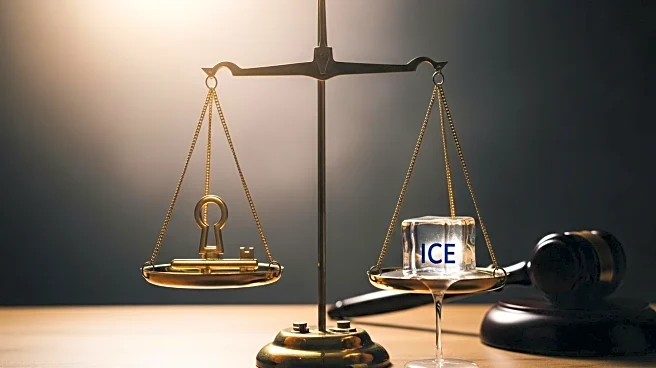What is the story about?
What's Happening?
The Supreme Court's recent shadow docket ruling in Noem v. Perdomo has ignited discussions about the implications for 4th Amendment rights concerning ICE activities. The case involves the wrongful arrest and detention of George Retes, a U.S. Army veteran, during an ICE raid at a legal cannabis farm in Southern California. Despite being a U.S. citizen, Retes was subjected to excessive force and detained for three days. Justice Kavanaugh's concurrence in the ruling suggests that brief encounters with immigration officers should not infringe on citizens' rights, yet Retes' experience contradicts this notion. The ruling has raised concerns about racial profiling and the treatment of citizens based on ethnicity and occupation.
Why It's Important?
This ruling has significant implications for civil liberties and the treatment of minority groups in the U.S. Critics argue that it creates a second class of citizens, particularly affecting people of color and manual workers, whose constitutional rights may be compromised. The decision could lead to increased racial profiling and wrongful detentions, exacerbating tensions between communities and law enforcement. The dissenting opinion by Justice Sotomayor highlights the potential for abuse of power and the erosion of constitutional protections, emphasizing the need for particularized suspicion in law enforcement actions.
What's Next?
The ruling may lead to further legal challenges and public outcry as affected individuals and advocacy groups seek to protect civil rights. Retes is pursuing a Federal Tort Claims Act suit against ICE and DHS, which could set a precedent for similar cases. The decision may prompt legislative efforts to address the balance between immigration enforcement and constitutional rights, as well as increased scrutiny of ICE practices.
Beyond the Headlines
The broader implications of this ruling touch on ethical and cultural dimensions, as it reflects the growing concerns over authoritarianism and the potential for government overreach. The case underscores the importance of safeguarding civil liberties in a diverse society and the need for accountability in law enforcement agencies.
















